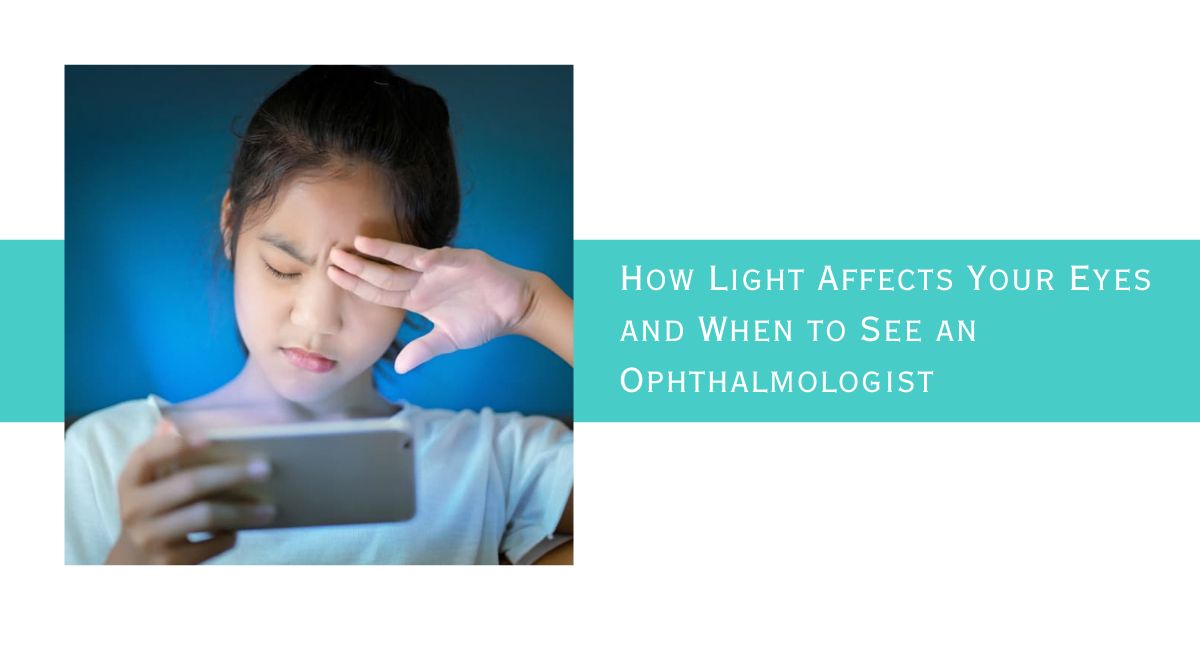How Light Affects Your Eyes and When to See an Ophthalmologist

Light plays a crucial role in vision, but prolonged or excessive exposure to different types of light can have harmful effects on eye health. Understanding how light affects your eyes and recognizing the warning signs that require a visit to an ophthalmologist is essential for maintaining long-term vision health.
How Different Types of Light Impact Your Eyes
1. Natural Sunlight (UV Radiation)
Exposure to ultraviolet (UV) rays from the sun can increase the risk of eye conditions such as cataracts, macular degeneration, and photokeratitis. Wearing UV-protected sunglasses can help reduce the harmful effects of UV radiation.
2. Blue Light from Screens
In today’s digital age, prolonged exposure to blue light from smartphones, laptops, and tablets is common. Blue light can cause digital eye strain, dryness, and may contribute to retinal damage over time. Taking breaks, using blue light filters, and adjusting screen brightness can help reduce eye strain.
3. Artificial Indoor Lighting
Bright LED and fluorescent lights can cause glare and discomfort, leading to headaches and eye fatigue. It’s important to ensure proper lighting conditions while reading or working to avoid unnecessary strain.
4. Low Light Conditions
Reading or working in dim lighting can force the eyes to work harder, leading to temporary discomfort, strain, and blurred vision. Adequate ambient lighting is crucial for reducing stress on the eyes.
When to See an Ophthalmologist
While occasional discomfort due to light exposure is common, persistent symptoms may indicate an underlying eye condition. You should consult a top ophthalmologist in Delhi if you experience:
1. Increased Sensitivity to Light (Photophobia)
Extreme sensitivity to light could be a sign of conditions like corneal abrasions, uveitis, or migraines. If light sensitivity persists, an eye specialist doctor in Delhi can diagnose the underlying cause.
2. Frequent Headaches and Eye Strain
Chronic headaches after prolonged screen use or exposure to bright lights may indicate an issue with your vision or eye muscles. Visiting an eye hospital in South Delhi for a comprehensive eye exam can help identify the problem.
3. Dryness, Irritation, or Redness
Continuous exposure to artificial lights and digital screens can lead to dry eye syndrome, which requires medical attention. A visit to an eye clinic in South Delhi can help determine the best treatment options.
4. Blurry or Double Vision
Sudden or persistent blurriness or double vision may signal eye conditions such as cataracts, glaucoma, or retinal issues. Consulting the best eye surgeon in Delhi is crucial for early diagnosis and treatment.
5. Difficulty Seeing at Night
If you experience trouble seeing in dim light or while driving at night, it could be a sign of vitamin A deficiency, cataracts, or other vision impairments. Seeking professional care from an eye specialist doctor in Delhi is recommended.
How to Protect Your Eyes from Light Damage
- Wear UV-protected sunglasses when outdoors to shield your eyes from harmful rays.
- Follow the 20-20-20 rule when using digital screens—every 20 minutes, look at something 20 feet away for 20 seconds.
- Use anti-glare and blue light filters on screens to minimize exposure.
- Maintain proper indoor lighting to reduce glare and strain.
- Schedule regular eye check-ups at an eye clinic in South Delhi to detect early signs of eye problems.
Conclusion
Light exposure is an unavoidable part of daily life, but managing its impact on eye health is crucial. If you experience any persistent eye issues related to light, consulting a top ophthalmologist in Delhi at a reputed eye hospital in South Delhi can help ensure timely treatment and long-term vision protection. Don’t wait for symptoms to worsen—prioritize your eye health today!

